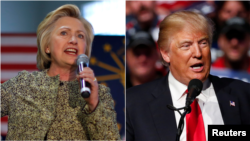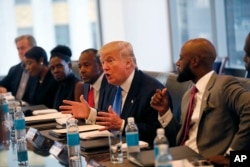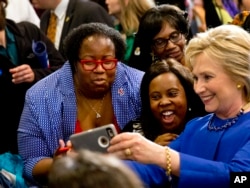Call it a long shot.
Republican nominee Donald Trump's campaign continues to try and woo black and Latino voters with whom he is lagging badly in the polls.
Trump, who trails Democrat Hillary Clinton nationally among African-Americans 87 percent to 8 percent — and 73 percent to 22 percent among Hispanics — met privately Thursday with black and Latino Republican activists in his New York campaign headquarters to discuss top concerns among minority communities.
The meeting's participants have launched a six-week get-out-the-vote initiative, to train more than 200 door-to-door volunteers to spread the word of Trump's economic policies, which he calls beneficial to minorities.
In recent stump speeches, Trump has produced a scathing assessment of Clinton's record with black voters, calling her a "bigot" and saying she has "no remorse" for impoverished inner-city communities.
Speaking to a mostly white New Hampshire crowd Thursday, Trump doubled down.
"Every policy Hillary Clinton supports is a policy that has failed and betrayed communities of color in this country,” he said. “But she just doesn't care; she's too busy raking in cash from the people rigging the system."
What Trump so far has failed to mention are specific policy proposals of his own, instead pointing to a history of welfare and incarceration-reform measures enacted in the 1990s by former President Bill Clinton and supported by the former first lady at the time.
Hillary Clinton, during a rally in Reno, Nevada, fired back at the businessman, whom she called "a man with a long history of racial discrimination."
"It takes a lot of nerve to ask people [who] he's ignored and mistreated for decades, ‘What do you have to lose?' The answer is everything!" she said.
Black activists, for their part, are left asking if Trump cares about their communities, why has he yet to address any minority-led organizations.
"[Trump] made a real spectacle of himself to go to a white community to talk to the black community," said Hazel Dukes, president of the National Association for the Advancement of Colored People (NAACP) New York chapter.
He is "not sincere," she asserted in an interview with VOA, noting that the NAACP had extended an invitation to Trump to speak, which he did not accept.
Many minds made up
In New York's minority communities thus far, Trump's modified stances do not appear to have stuck.
North of Trump Tower, on the other side of Central Park, is a vibrant West Harlem neighborhood called Le Petit Sénégal. There, the minds of many of the African diaspora are already made up.
"He's too late," said Oumou Sy, a U.S. citizen from Dakar — proudly dressed in a floral orange-red m'boubou — who runs a salon on West 116th Street. "He cannot convince me … he's just a businessman."
Sy, who has lived in the United States for 26 years, says that in order to change minds in her community, Trump would have to radically change his stance on immigration reform and ensure affordable housing for the country's poorest.
Diouma Gueye, who became a citizen in 2011, agrees with Sy's priorities. She insists that nothing Trump says at this point will change her decision at the polls.
"From the get-go, when he talked about Mexicans and other races or ethnicities, I didn't appreciate that," Gueye said.
WATCH: Residents of Harlem Neighborhood Talk about Trump
Action over words
Nationwide, Sy and Gueye's sentiments echo much of the black community, who want to ensure that the next president — whether Clinton, Trump or a third party candidate — are held accountable for past remarks and future promises.
Benjamin Ndugga-Kabuye, policy analyst at the Black Alliance for Just Immigration (BAJI), told VOA there is reason to be concerned that either candidate might be detrimental to their causes.
"We need someone who … is committed to repealing the 1996 laws that not only created welfare, but also created the mass criminalization system that we have now," Ndugga-Kabuye said. "We don't see Trump willing to do that, or Clinton."
BAJI, a local organization which advocates to end structural racism and systemic discrimination against African-American and black immigrant communities, is dedicated to repealing the 1996 immigration laws enacted by former president Clinton — including mass detention and deportation measures — which they argue have unjustly and lopsidedly affected black immigrants and communities of color for the past two decades.
Ndugga-Kabuye said he believes a Trump presidency would only dovetail with a record of cutting social spending while increasing law and immigration-enforcement measures.
"Ultimately, there is nothing new or interesting about what Trump is saying," Ndugga-Kabuye said, "this is just a continuation of the Bush, Clinton, and Reagan trajectory."
Long history of minority outreach
Hillary Clinton's 2016 campaign has placed racial justice as a priority in its policy platform, vowing to reform sentencing laws and fight for comprehensive immigration reform, including an end to private immigrant detention centers.
Eric Foner, American historian and member of The Nation's editorial board, describes Clinton's history with the black community as mixed.
On the one hand, he views the crime bill and welfare reform of the 1990s as disadvantageous to large numbers of blacks, but he says the view of the Clintons is mostly favorable.
"[African-Americans] tend to think positively about the Clinton administration back in the ‘90s when, in fact, many blacks did benefit from the general prosperity of that period," Foner told VOA.
But most voters, he said, are thinking, "What can you do for me now?"
VOA’s Bernard Shusman contributed to this report.










